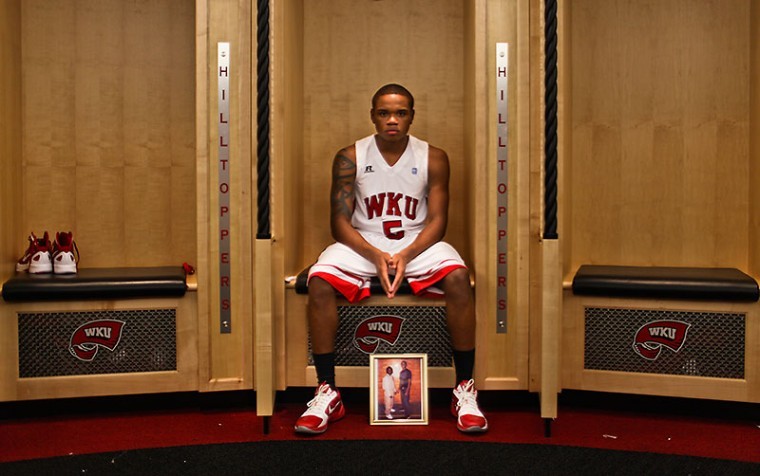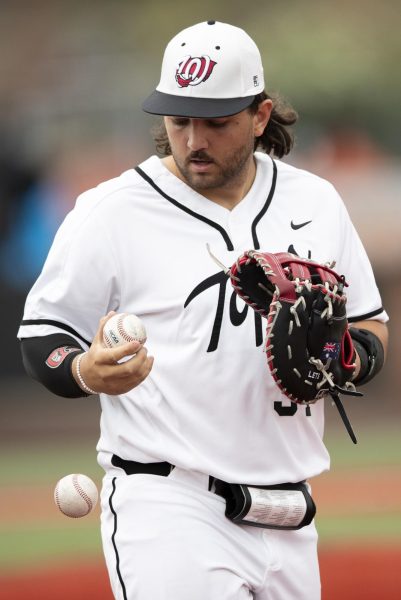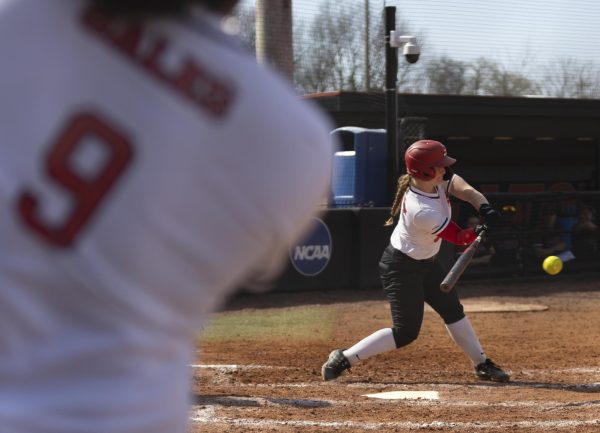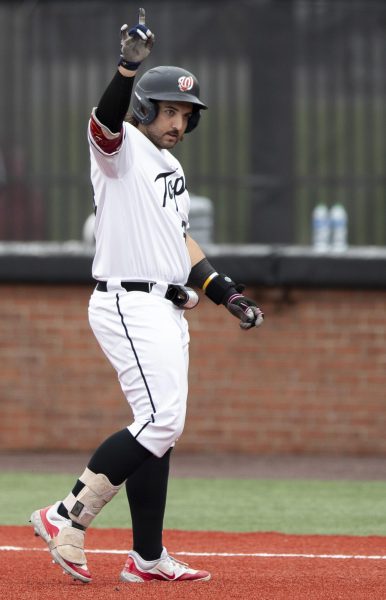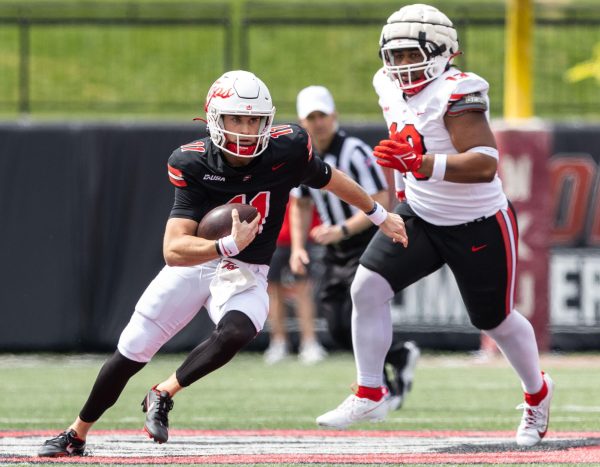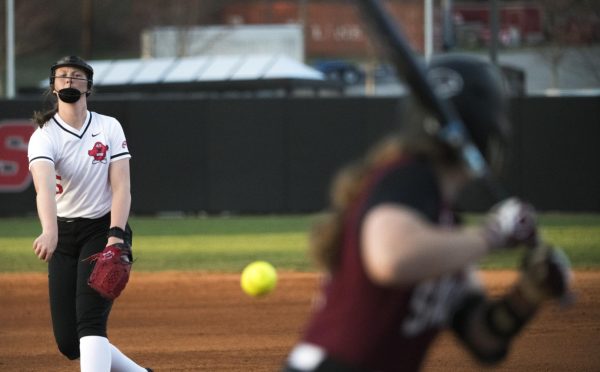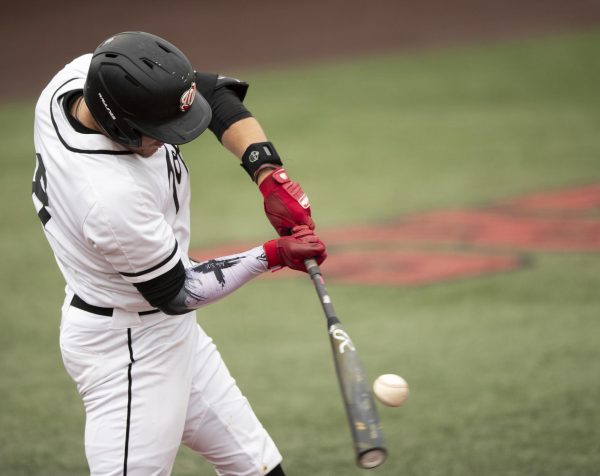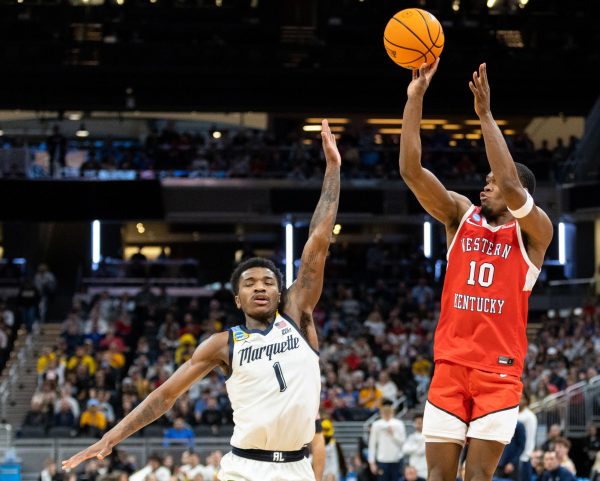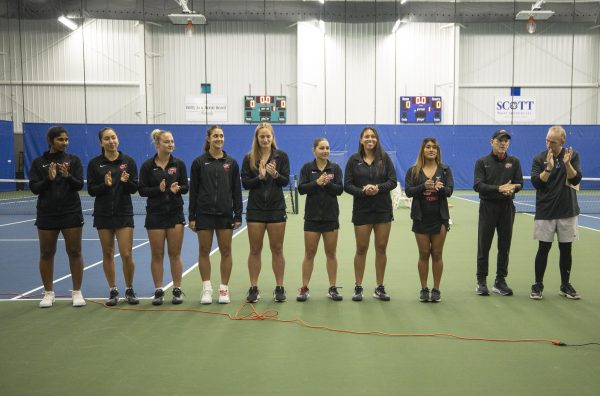Freshman Gordon devoting basketball career to twin brother
October 25, 2011
Derrick Gordon keeps a photo of him
and his fraternal twin brother Darryl in his dorm room. In his
locker at Diddle Arena sits another, similar picture of the
two.
It’s how the star freshman keeps his
mind focused on his brother throughout the day.
“When I look at that picture, I just
kind of sit there and think, and I get emotional,” he said. “I know
he could have been at the same place that I’m at playing basketball
and going to school, and it’s not happening because of the
situation he’s in.”
Derrick has dedicated his basketball
career to Darryl, who was put in prison at the age of
16.
In May 2009, an incident arose in a
Plainfield, N.J., neighborhood between Darryl and another man.
Derrick said another neighborhood kid had been “picking on” Darryl
for several weeks, making fun of him for things like his short
stature, and it hit its boiling point on this particular
day.
The other man knocked Darryl’s hat
off his head, not fearing any retaliation from Darryl, even though
Derrick said Darryl had a temper problem.
The other man showed a knife, so Darryl pulled out a
gun and shot the man several times in his chest from point-blank
range.
It required him to have open heart
surgery, and Derrick said he’s still not sure how the man
survived.
Darryl was arrested and charged with
attempted murder and sentenced to five years, one month and six
days in prison.
Derrick received the news during
basketball practice when he was 16 years old.
“I was shocked. I was just stunned,”
he said. “It was just hard to believe because my family isn’t in to
all that — violence and getting arrested and stuff like
that.”
When Derrick takes the court this
season in his first year at WKU, he’ll don No. 5 — the number his
brother wore when he was a basketball player.
On the left side of Derrick’s chest
is a tattoo that reads “M.B.K.,” which stands for “My Brother’s
Keeper.” On the right inside of his arm reads another that says
“HOPE and FAITH,” and on the left side reads “FAMILY
FOREVER.”
Derrick said Darryl is his main
source of motivation and is what drives him to work harder each
day.
“I’m basically just working hard and
trying to make it to that next level so that when he gets out, he
has something to come home to,” Derrick said. “Everything I do
right now is for him — on and off the court.”
Derrick’s dream was for his
basketball career to continue with Darryl’s. In middle school,
though they were both still young and underdeveloped, it looked as
if that might be a possibility. Derrick said he and Darryl started
receiving interest from the same colleges about
basketball.
Derrick’s father, Mike Gordon, said
Darryl, a point guard, was the more athletic one of the two when
they were both younger, and it stayed that way for a
while.
“I would tell the school that the
only way I’m coming is if he was coming,” Derrick said. “At the
same time, Western Kentucky was looking for a point guard. It could
have worked out real perfectly.”
But several things changed once the
two got to high school. Derrick grew to 6-foot-3 while Darryl
topped out at 5-foot-5.
Derrick grew into a quiet, somewhat
introverted personality while Darryl became more outgoing, Mike
said.
The biggest change came when Derrick
said he wanted to go to St. Patrick High School instead of
Plainfield High School where Darryl was going.
Derrick was attracted by St.
Patrick’s nationally-regarded basketball program. In the past five
years, three St. Patrick players were named McDonald’s
All-Americans and went on to play at major Division I college
basketball programs Duke, North Carolina and Kentucky.
At first, St. Patrick’s basketball
coach Kevin Boyle wasn’t on board with Derrick’s
decision.
“He came as an eighth grader and he
was dying to go to St. Pat’s. Personally I didn’t think he was good
enough,” Boyle said. “He called, and called, and called, and
called. He was always a hard worker and had a lot of self
confidence in his game.”
But Derrick enrolled at St. Patrick.
It was the first time he and Darryl had ever really been separated
for a long period of time.
Darryl continued his basketball
career at Plainfield High School, but never reached the level of
success that Derrick experienced.
Darryl began trading his practice
time for other activities. He got mixed up with a rough crowd and
started hanging out on the streets.
Mike Gordon said he and his wife
Sandra started blaming themselves for Darryl going down the wrong
path.
“As a father it’s like, people are
always giving you credit for the good job you’re doing with the
kids when they do well,” he said. “On the other side, they tell
you, ‘We know you did everything you could. It’s not your
fault.’
“But then it’s like, how could you
take credit for the positive stuff, but not take the blame for the
negative stuff?”
Derrick put blame of what happened
to Darryl on his shoulders.
“I tried to talk to him, but I
didn’t talk to him as much as I could have,” Derrick said. “I could
have done a lot more to prevent the situation, but things happen
for a reason.”
Derrick had trouble opening up to
people in the aftermath of it all. The heartache that he was
feeling about missing his brother was kept bottled up
inside.
“I stayed to myself,” he said. “I
just didn’t want to talk about that whole situation because it hurt
me so much inside.”
Derrick then went through a three-
to four-month period when he wasn’t eating enough. His mother
Sandra didn’t call it depression, but said he was visibly hurting
and lost a lot of weight.
The teachers at St. Patrick had no
idea what was causing it.
“No one knew,” she said. “I went
there one day because the guys wanted to talk to me and I just had
to come out with it. Then Derrick — that’s when he really started
to open up. I always told him if you talk about it, you’ll feel
better.
“They were real close. They did
everything together. It was like taking half of him
away.”
Boyle said it got so bad at one
point that Derrick considered transferring from St. Patrick to
Plainfield High School to be closer to home.
“To his mom’s credit, she made him
stay,” he said. “That was a life-changing decision for
him.”
Derrick eventually got to visit
Darryl, and they exchanged letters back and forth. Once that
happened, Derrick slowly regained the weight he lost.
And when he finally saw Darryl
again, Sandra said his face “lit up.”
“He just smiled,” she said. “They
just laughed and talked and he was just so happy. After that he
went on to school and things just started getting better for
him.”
Fast forward to Derrick’s senior
year of high school at St. Patrick. He had already signed his
National Letter of Intent to play at WKU, but this was still a
chance for him to make a name for himself.
After what Boyle called a “horrible”
preseason, Gordon responded with 37 points against Chicago’s
Whitney Young High School at the City of Palms Tournament in Ft.
Myers, Fla.
Derrick emerged as one of the key
players on St. Patrick’s team last season, the second leading
scorer behind Michael Gilchrist.
But there were times throughout the
season when thoughts of Darryl would creep back into Derrick’s
mind. Boyle had to balance being a tough coach while also being
understanding of the fragile emotional state that Derrick found
himself in occasionally.
HBO made a documentary on St.
Patrick’s 2010-2011 season entitled “Prayer for a Perfect Season,”
— set to air Tuesday — and Boyle said there’s a scene that shows
him trying to make that balance, although it could seem a little
harsh because only a clip of the conversation was shown.
His message was that while he and
the team understood what Derrick is going through, they still had a
job at hand — to win basketball games.
“One day you’re going to go to work
and your boss is going to feel bad about something in your life,”
Boyle said. “But at a certain point, you need to be accountable to
him and the rest of the team, or they just can’t carry you if you
can’t handle it.
“It was that type of message. We
can’t keep putting you on the court if you’re not
producing.”
Gordon has now had a few months to
get acquainted with Bowling Green, which is roughly 850 miles from
his home in Plainfield, N.J.
He hasn’t seen his brother since
May, and he’s not sure when he’ll be able to next. Darryl moved
from a youth correctional facility in Bordentown, N.J., nearly two
hours from Derrick’s home to South Woods State Prison.
He knows he’ll see him eventually
and is counting the days until Sept. 30, 2014 — the day that Darryl
is set to be released from prison.
But until then, Derrick’s life and
basketball career are focused on what his brother last said to
him.
“He just wants to see me succeed,”
Derrick said. “He knows how badly I like to win and how bad I want
to get to the next level. He told me that, no matter what, just
stay focused and play hard.
“When he told me that, I stuck by
it. Now I’m just on a mission right now. I’m sure a lot of people
see that.”

